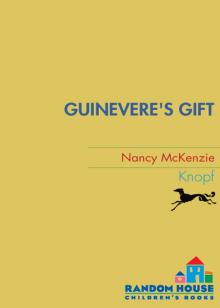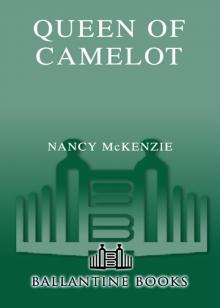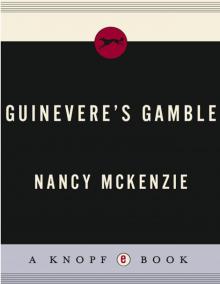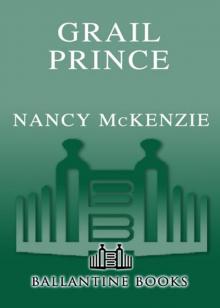- Home
- Nancy McKenzie
Grail Prince Page 17
Grail Prince Read online
Page 17
Galahad gulped. “Cordovic’s older than me, and he’s never been to Britain.”
A smiled touched Lancelot’s lips. “Cordovic! No, indeed. It’s not for everyone. Bors is a good man, as solid as the earth, but Cordovic has yet to prove what kind of soldier he will make. You, Galahad . . . you are my son. Because Arthur is who he is, you won’t have to wait until you’re old enough for warrior’s training to prove yourself. You may come to Camelot now. Permission has already been granted.” The boy’s eyes widened. “There are other boys in Camelot. You won’t be lonely or afraid for long.”
“I’m not afraid!”
Lancelot smiled. He held out the dagger again. “Then will you come with me?”
Galahad looked down at the leaves on the grave and took the dagger from his father’s hand.
15
THE GOLDEN CITY
Two days after crossing the Narrow Sea, Lancelot and Galahad reached the rolling hills of the Summer Country and headed north along the Roman road toward Caer Camel. From his perch atop his father’s stallion Galahad had a fine view of the magnificent country all around them. If he had to share a horse, he was glad it was Nestor. Nestor was the finest horse in the kingdom. His strength and speed made Glory seem like a half-grown yearling.
“Almost there.” Lancelot’s voice sounded in his ear, taut and eager.
Galahad noted the change in him. In all those long winters at Benoic, Lancelot had scarcely spoken above a dozen words in Galahad’s hearing. But on the swift journey to Camelot he could not keep still. Hesitantly at first, and then in an unbroken flow, words poured out in a constant stream. Some Galahad took in, but most swirled by uncomprehended: talk about the rolling downs, the local kings, tales of Saxon battles as they passed nearby the border, vivid descriptions of Arthur’s brilliance as commander, a history of the ancient wars, gossip about this lord and that—on it flowed in an eager torrent until, in spite of his misgivings, Galahad began to feel light-headed. The man’s pleasure was impossible to resist. Lancelot was so happy that he could not hold it in. Now, as the horses’ hooves clattered on the worn stone blocks of the Roman road running straight as an arrow up the wide Camel valley, he exuded a joy that engulfed the men around him and sent everyone’s spirits soaring.
Every night of the journey Lancelot talked to Galahad of Camelot and the things that he would see there, but even so, the boy’s first sight of the great fortress amazed him. High on a green hill sat a castle built of golden stone, banners flying gaily from her towers, protected by a triple ring of fortifications. In the southwest corner a wide road paved with stones curved upward to the huge double gates, King’s Gate, the soldiers called them. Never in his life had he seen anything that took such skill to build. Through these gates and down this broad causeway King Arthur and his Companions had ridden forth a hundred times to the Saxon wars.
The soldiers at the guardhouse saluted Lancelot and called out welcomes. As they passed down the streets of the thriving town, folk came out to greet them. Men saluted, women curtsied, smiling, children hid behind their mothers’ skirts and stared, faces alight with admiration. Galahad felt the strong arm tighten about his waist. The wave of affection engulfed him, too. He realized with a distinct jolt that here in Camelot, Lancelot was openly beloved. Everyone acted as though he were a long-lost son, coming home.
In the castle courtyard grooms appeared from nowhere to take their horses. Lancelot greeted them all by name. Galahad stared at the arching stonework and curved windows of the castle, at the magnificent stableyard glimpsed through a line of trees, at the very grooms whose boots were better than his own. It was all too magnificent to be real.
Up wide marble steps they went, side by side, and through a pair of stout oak doors carved with dragons. In the cool, dark vestibule servants brought them bowls of clean water and they washed the dust of travel from their faces, hands, and hair. Lancelot thanked the servants and greeted them by name. They turned down a long corridor. Galahad had to trot to keep up with Lancelot’s long strides. There was hardly time to admire everything: glazed floor tiles in the Roman pattern, like the ones they had in the great hall at Benoic, only newer; the shiny armbands the sentries wore, and the dragon buckles on their swordbelts; the hall sconces, intricately worked in old Celtic patterns, every one the same and yet different; and above all, the air of order, peace, and power that pervaded everything. Excitement filled him as he trotted along beside his father. To be a part of this! To be the son of Lancelot in this wonderful place!
They came to a door with double guards. Both sentries saluted Lancelot and he greeted them like old friends. Within was a large room which gave onto a garden. All the benches had cushions worked skillfully in many colors, very much in the style of his father’s Hawk hanger. The windows were glazed and thick tapestries hung upon the walls. Near the open garden door stood a heavy table with curved feet where a man in a plain robe sat, chin on fist, dictating to the scribe at his elbow. The table was piled with scrolls and clay tablets. A bowl of cut glass filled with roses scented the air with rare perfume. Beneath the table a handsome white hound scratched lazily for fleas. There was no one else in the room but man and scribe. In vain Galahad looked around for the King.
The man at the desk looked up as they entered and his smile lit his face.
“Lancelot!”
“Arthur!” Lancelot knelt. The man rose and came swiftly around the table to raise Lancelot and embrace him. Galahad stared in disbelief. Although tall and broad-shouldered, with the carriage of a warrior, this man wore a brown robe of simple woven stuff without a single stitch of adornment. His sandals were old, soft and worn. He had no sword, no badge, no armband, no shiny buckles. Yet this was Arthur, High King of Britain.
“You are earlier than I expected.”
“There was no need to stay. Galyn is there. I have brought my son Galahad to meet you.”
The High King turned to him. As he had been instructed, Galahad took the King’s hand and, bending his knee, kissed the royal ring. This was of heavy gold and held a great ruby with fire in its depths and the Dragon of Britain carved small upon its surface. He swallowed in a dry throat and stared up at the man he had mistaken for a servant.
“My lord Arthur.”
The High King looked amused. “Welcome, Galahad, Prince of Lanascol. Welcome to Camelot. I expect you will like it here, even if I am not what you expected.”
Galahad flushed and bit his lip. Arthur squatted down so his face was at Galahad’s level. Like Lancelot and the rest of his Companions, he shaved his beard and it gave him an air of youth. His warm brown eyes seemed to look straight into Galahad’s heart. He smiled again. “You will be a fine soldier one day, Galahad, a knight of stainless honor like your father. I hope that, like your father, you will serve me and not one who stands against me. I want your sword on my side.”
Galahad hardly dared to breathe. The High King of Britain spoke of swords and service, man to man, to a boy who had just received his first dagger! Galahad straightened to make himself taller. “I will serve you, my lord. You have my word.”
The High King nodded gravely. “Thank you, prince. I will remember your promise.”
He rose and with a wave of his hand dismissed the scribe. Picking up a scroll from the table, the King turned to Lancelot and then paused. “Galahad, would you do me a kindness and leave me alone with your father for a moment? Perhaps you would await us in the garden. The fountain might interest you—there’s not another like it in the world.”
Obediently, Galahad slipped out the open doorway into the sunlit garden. The fountain was an alabaster dragon, smooth and white, standing on hind legs with water streaming from its mouth instead of fire. Its claws were tipped with gold and its nostrils painted red. Though fierce of face, it looked happy enough to be there, surrounded by sunlight, bright flowers, and joyful music. Indeed, who would not be happy in such a place? He wondered if even the Garden of Eden could have equaled this.
It took hi
m a moment to realize that the music was not coming from the fountain. He heard a woman’s voice, high and sweet, from somewhere farther off. After a swift glance at the doorway to see if his father was still in conference, he went in search of the singer. His mother used to sing to him now and again, nursery songs in a language he had never understood—Old Welsh she had called it, the tongue of bards—but she had never sung like this. This was a pure voice, sweet and glorious, that drew him onward without his knowing he was drawn.
He turned a corner of the walk and stopped in his tracks. There she was, singing while she cut armfuls of fragrant roses, a woman lovelier than any woman he had ever seen. She might have been an angel of God, for she was fair beyond any human fairness, with white-gold hair so light, so radiant, it could have been a halo about her head. Tall, slender, dressed in a gray-blue gown, she sang to herself as she stretched forth a long, pale arm toward the glowing blooms. Her graceful movements, the pretty way she held her head, the flush of health that sprang beneath the creamy skin—he recognized that this was beauty, undeniable, unsurpassable, supreme, as real and as encompassing as the daylight itself.
On the thought, she saw him from the corner of her eye and turned toward him, the song dying upon her lips. Her eyes were a deep, dark, amazing blue, alive with an intensity that transfixed him. She smiled shyly, and the world about him seemed to grow soft, sweet, and vibrant. He was seized by a desperate longing to do anything to please her.
“Hello,” she said. He swallowed hard. She put down the sheaf of flowers she carried and laid the cutting knife carefully beside them. Then, to his complete astonishment, she bowed her lovely head and made him a low reverence. “Good day to you, my lord.” She sat gracefully on a stone bench near him, and he walked up to her without knowing that he moved. He could not take his eyes from her face. When he looked at her he felt like singing.
“I do not know you, sir,” she said, reaching out a hand to him. “Are you a visitor in Camelot? Will you stay long with us?”
Her flesh was warm and firm and fragrant. He longed to climb up on the bench and sit in her lap. “Beautiful lady,” he said softly. On impulse, he kissed her fingers.
She smiled, the color rising slowly to grace her cheeks, and he smiled back, entranced. “You are a gentleman, I see. With princely manners. Where is your home, my lord? Who is your—”
Suddenly she broke off, hearing something, and rose, gazing past the hedge at someone he could not see, joy suffusing her features, her whole being alight. Someone was coming down the walk, someone she was awaiting. Politely, knowing he was forgotten, Galahad withdrew, and only at the last looked back.
Lancelot turned the corner. With a cry of joy she ran into his arms, held him tightly as he kissed her lips and whispered in her ear, his eyes closed, his heart manifest upon his face.
“Guinevere! My dear love, it feels like years I’ve been away.”
Galahad stood motionless. Around him the day grew dark, shot with light and shadow. It beat against his chest, pounded at his temples. Lancelot’s lips caressed the woman’s face as his hands slid over her gown. She leaned into him and they clung together, one soul, one longing, in the radiant sunlight of the High King’s garden.
He turned and ran. He ran until he could run no more and collapsed, blind with tears, against the cold stone of a deserted outbuilding. He wept with a force that frightened him, pounding the earth with his fists, sobbing for Aidan, for his mother, for Almighty God. At last, his young fury spent, he dozed off, still whimpering in exhausted sleep.
He awoke to the touch of gentle hands. Strong arms lifted him with care and held him close and warm. “Galahad,” said a man’s voice in his ear, “to please God you must live well, and that takes courage.” He stared through swollen eyes at Arthur’s face, so near his own. “You are a brave lad,” the High King said softly, “but you have a lot to learn. Some things will not be easy. Always keep a little mercy in your heart.”
“I saw them . . . together . . . I saw . . . my father and—”
“Shhhhh.” The High King kissed his wet cheek and held him closer. “I know. But remember this: Always keep a little mercy in your heart.”
“My lord.” Galahad sobbed into the High King’s shoulder, exhaustion leaving him defenseless against compassion, the dark truth of his secret shame spilling into this stranger’s calm, accepting heart. “He never loved my mother so!”
PART III
Three Tokens
In the second through fifth years of the reign of Constantine
16
THE SMITH’S TALE
It was almost dark when Galahad and Percival stopped to rest. Behind them lay the valley of the Deva River and ahead, shadow upon shadow, the rising mountains of Rheged. The long summer twilight lingered as they staked their horses, laid out their bedrolls, and gathered firewood. As night drew near they sat down to their meal.
“I’ll take first watch, if you like,” Percival offered, licking his fingers. “I’m not at all tired.” Galahad nodded, stoppered the wineskin, and unbuckled his swordbelt. Without speaking he lay down on his bedroll and turned his face away.
Percival watched him, wondering for the thousandth time what was the matter with him. It hadn’t been difficult, after all, to leave Gwynedd. That foggy afternoon when Galahad had come galloping in and ordered him in clipped tones to pack his belongings and a bedroll, he had doubted it would really be possible to leave. What could he say to Peredur that would not sound like an affront? Uncle, I want to go with my cousin to look for something, we don’t know exactly what, that’s hidden someplace, we don’t know exactly where, until I’m old enough to come back and reclaim my birthright from you. . . . He smiled to himself. He should have known he could leave it safely in Galahad’s hands. Galahad addressed Peredur as one knight to another and begged his leave to take Percival as his companion on a mission he had sworn to Arthur he would perform. Sadly, he had needed to say little more than that. Peredur was so relieved he almost smiled. Regret had shown upon his features—Percival had always liked his uncle and the liking was returned—but his relief at having his rival gone was too great to conceal.
Percival’s brow furrowed when he thought about Dane. She had reappeared just as they were leaving, kissed him and slipped him her lucky rabbit’s foot, whispered her good wishes and farewells, and then, without a word to Galahad, vanished within doors. Such behavior was so unlike her it astonished him still. What could have happened to upset her so? Whatever it was, she was no doubt past it by now—unlike Galahad, who had scarcely spoken a word to him the entire week they had been on the road.
A wolf called, low-voiced and mournful. Percival drew his sword and inched closer to the flames. For the first time in his life he was free to do as he pleased. No more yielding to the demands and desires of older people. All his life he had been under someone’s yoke of obedience: his father, his mother, Arthur’s commanders, even the priestesses at Avalon. Now he was alone with his silent cousin. There was no one about to tell him what to do and see that he did it. He felt both free and uncomfortably uprooted.
“Drop the sword, bitch’s whelp, or die!” A sword point pressed into his back. He froze. The sword point prodded him sharply, and he let his hilt slide from his hand.
“Galahad!”
A fist smashed against his head. “Silence!”
The world swam dangerously and Percival lay still, unable to breathe. Hands searched his body, took his dagger from his belt—his grandfather’s dagger! He pushed up to one elbow and shook his head to clear his vision. In the firelight he could see three big-boned men in rags. Two of them held Galahad; the third held Percival’s sword.
“Who are you?” Galahad demanded. “What do you want with us? If you are thieves, we have little of value.”
“Ha!” snorted his captor, pulling Galahad’s sword from its scabbard. “Lies won’t help. Just look at this sword, Ralf! What a beauty! The hilt’s inlaid with gems!”
Ralf grinned, sh
owing blackened teeth. He brandished Percival’s sword. “Aye, and this one be worth something, too! Garf, we be rich men now!”
“Nothing of value,” Garf mocked. He hawked and spat. “Where did you two mewling brats steal these weapons?”
“That’s my father’s sword.”
Garf laughed aloud. “It’s mine now, princeling. Dinias, check the saddle packs.” Dinias loosed his hold on Galahad and lumbered toward the horses.
Galahad spoke calmly. “I don’t have a saddle pack. I don’t use a saddle.”
“Don’t you, indeed?” Garf, still gripping Galahad, looked him up and down. “Who do you think you are, you pretty little catamite? Lancelot du Lac? Ha ha ha!”
Galahad went white. They all laughed heartily. Dinias had reached the horses and put a hand out to Farouk. Galahad whistled sharply. The stallion rose, screaming, on his hind legs, pulling the stake from the ground and striking out with his forelegs for Dinias’s face.
“Look out!”
“Christ Jesus!”
“Son of a bitch!”
Galahad drove his knee into Garf’s groin, twisted free of his grip, dove to the ground, rolled, came up with his dagger in his hand, and threw it. Garf howled and grabbed his wrist, dropping the sword. Galahad sprang, got his hand around the hilt just as Ralf leaped for him, sword raised. Percival stuck a leg out; Ralf sprawled headlong. Percival reached for his sword, got a kick in the head and an earful of curses. But it was enough to give Galahad a chance to back away, sword in hand, and face his attackers.
All three of them came at him at once. Percival sat up, hunched in pain, and watched. The ruffians fought from pain and fury; Galahad was cool. They flung themselves at him, striking wildly, shouting. He dodged, moving swift and sure as a cat, every stroke of his finding flesh while the other blades whirled uselessly around his ears. Although it looked one-sided, Percival knew it was no contest at all.

 Guinevere's Gift
Guinevere's Gift Queen of Camelot
Queen of Camelot Guinevere's Gamble
Guinevere's Gamble Grail Prince
Grail Prince Prince of Dreams
Prince of Dreams